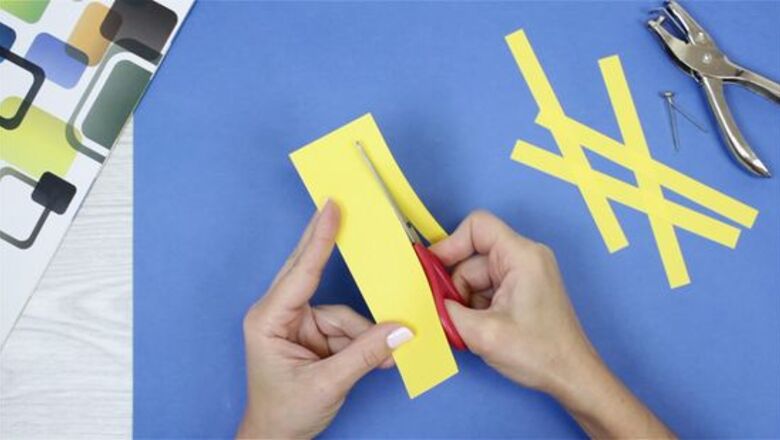
views
Using Strips of Paper
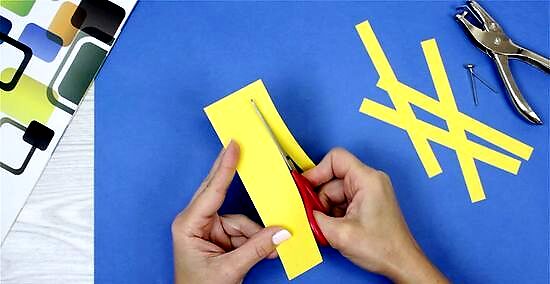
Cut your paper into strips. Choose a thicker paper like cardstock or construction paper for a sturdier sphere. You can also use decorative scrapbook paper or plain copy paper if you’d prefer. Use sharp scissors to cut your paper into 12 strips that are ½-inch (1.25 centimeters) wide and 6 inches (15.25 centimeters) long.
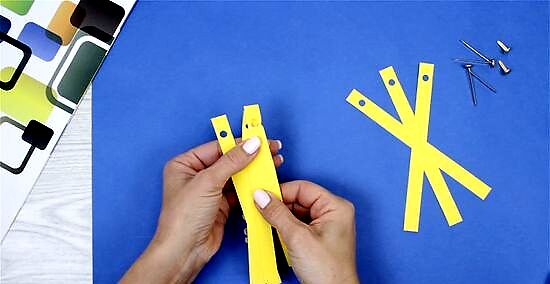
Punch holes through both ends of the strips. Evenly stack the strips of paper. Punch a hole on either end of the stack using a standard hole punch. The holes should be about 1/4 inch (0.6 cm) from either end. If you have difficulty punching a hole through the entire stack, separate the stack into two or three piles and punch the holes into these smaller piles. Just make sure that the holes you punch are evenly placed from stack to stack. If you decide to use decorative or printed paper instead of blank paper or blank cardstock, stack the strips so that the decorative side all faces one direction.
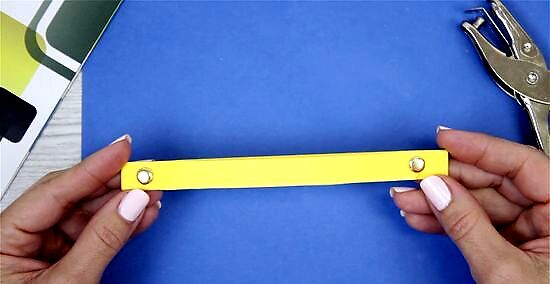
Insert paper fasteners into the holes. With the strips all in one stack, place a metal paper fastener into the hole on either end. Flatten the "tail" of the fastener against the back of the stack. If you are using strips cut from decorative or patterned paper, position each fastener "head" against the decorated side of the paper.
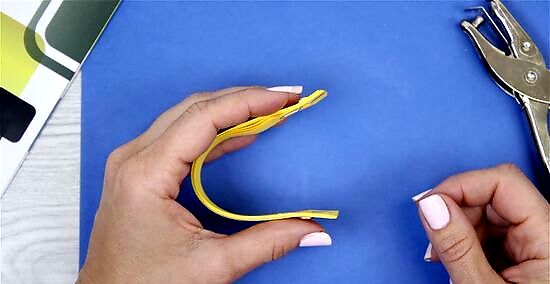
Form a C-shape with your stack. With both ends secured, use your hands to carefully bend the stack of strips into a C-shape without creasing any of the strips. If you’re using decorative paper, remember to have the image face outward.
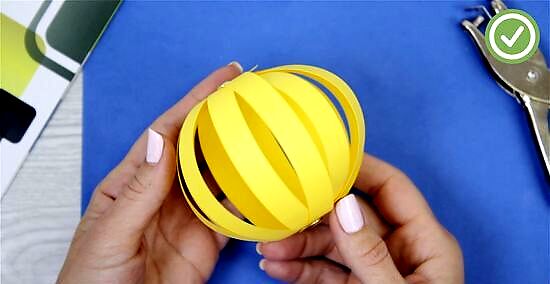
Slide the strips away from the stack. While the stack is bent, gently pull the strips apart, spreading them into the shape of a sphere. You can adjust the pieces to overlap to make your sphere look more like a globe, or you can create spaces between the paper to make it look more like a lantern. If you want to hang your sphere, wrap the middle of a piece of thread around one of the metal fasteners. Then wind the thread several times. Knot the ends to form a loop, which you can use to hang it. You can easily flatten the sphere by sliding the paper strips back into a stack.
Using Papier-Mâché
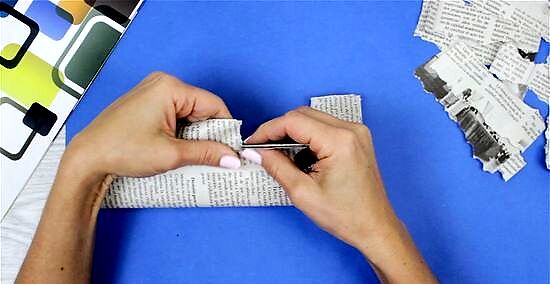
Cut up strips of paper. Choose a thin paper like plain copy paper or newspaper. While your strips do not have to be a certain size, they should be smaller to make them easier to form into a sphere. Start with strips that are 1.5-inch (3.8 centimeters) by 3-inch (7.6 centimeters). You can cut more strips if you'd like a different size. Smaller strips will allow for a smoother surface.
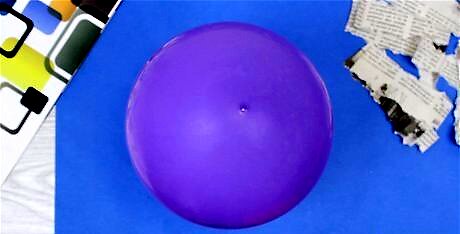
Blow up a round balloon. You may need to under-inflate the balloon to ensure that you get the right shape. Before you tie it, make sure that it's approximately the right size for your sphere.
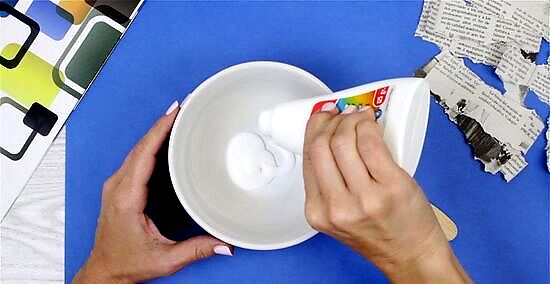
Make your papier-mâché paste. Pour ¼ cup (59 milliliters) of school glue into a bowl. Add ⅛ cup (30 milliliters) of water. You will need a lot of papier-mâché paste to complete your project, but you don't want to expose unused glue for long because it can start to dry. You can adapt the recipe to change the quantity by maintaining a ratio of 2 parts school glue and 1 part water. You will need to make more papier-mâché paste as you work on your sphere.
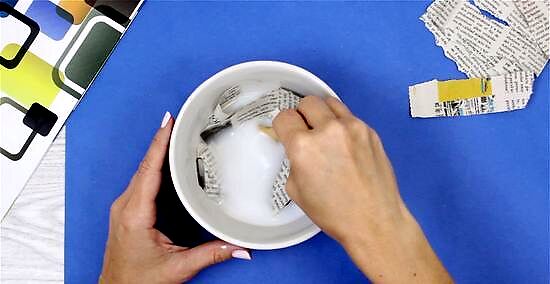
Dip a strip of paper into the glue. You want the entire strip of paper to be covered in glue on both sides. Give your paper a moment to soak in the glue. More glue is better than less, as a generous coating of glue is what will help you create your papier-mâché. Your hands will get covered in glue while you work on this project, so keep a towel handy to wipe off the drying excess glue.
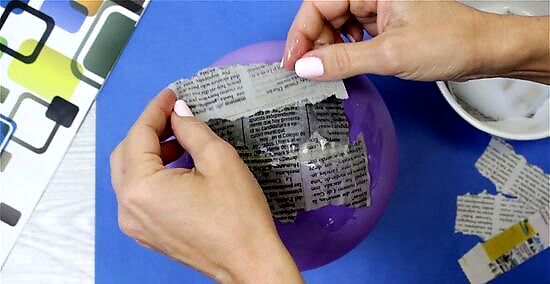
Apply the paper strip to the balloon. It doesn’t matter which direction you apply your paper strip because you will be covering the entire surface of the balloon with multiple layers. Smooth down the edges of the strip to create a flatter surface. Your paper mâché sphere will have some bumps because of the process, but you can keep it relatively smooth by carefully applying the paper. Keep your balloon in place by sitting it in a bowl while you work. This will prevent the balloon from rolling or slipping away.
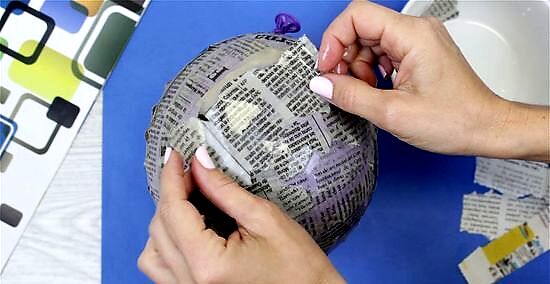
Continue to apply paper strips to your balloon. Dip and apply paper over the entire surface of the balloon, overlapping your paper strips to create a solid layer over the balloon.
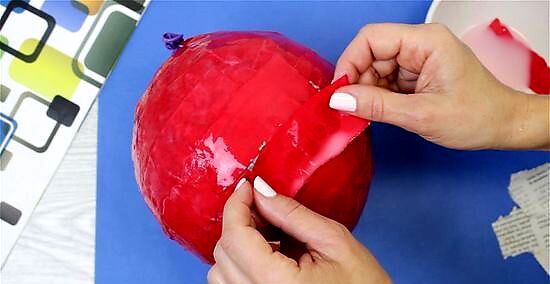
Apply two more layers of paper. Once you’ve fully covered your balloon with paper, repeat the process twice to add two more layers of papier-mâché. You will need three layers in order to have a stable sphere. To keep track of your layers, it’s a good idea to use different types of paper for each layer.
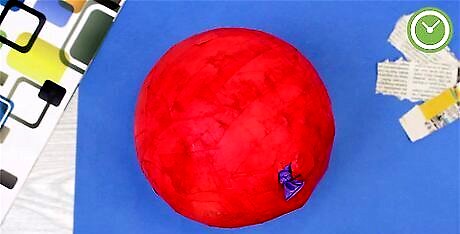
Allow your sphere to dry. It will take about 2-3 days for your sphere to fully dry. You can hang it by the end of the balloon to allow the air to better circulate.
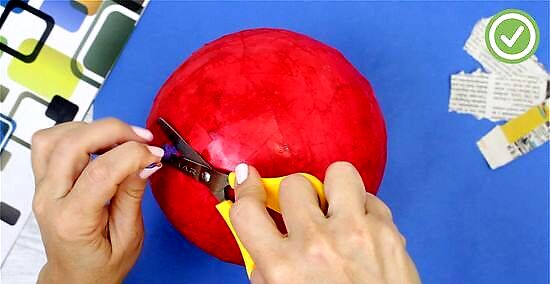
Puncture the balloon. To remove the balloon, you will need to puncture or cut near the exposed end. After you make your cut, pull out your balloon. Once the balloon is removed, you can add one more piece of paper to cover the hole if you prefer. Your final product will be a paper sphere. Alternatively, you could just remove the end of the balloon. Once the sphere is done, you can paint it or use glue to add embellishments.
Using Geometric Shapes
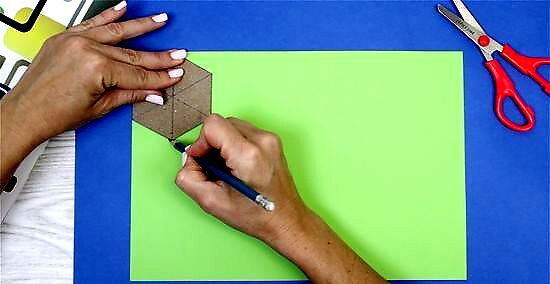
Trace your geometric shapes. On sturdy paper, trace 20 hexagons and 12 pentagons. To make sure that they are all identical, use a template. You can either create your template by drawing the first one, or you can use a pre-made template. If you draw your own, make a template with each side measuring 2 inches (5 centimeters). If you want a different size sphere, change the size of your geometric shapes, making sure that all the sides are equal in length.
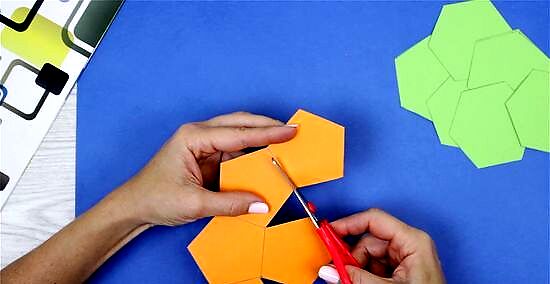
Cut out your shapes. Use your scissors to carefully cut along the lines that you traced. The shapes need to be the same size, so make sure that you perfectly cut along the lines.
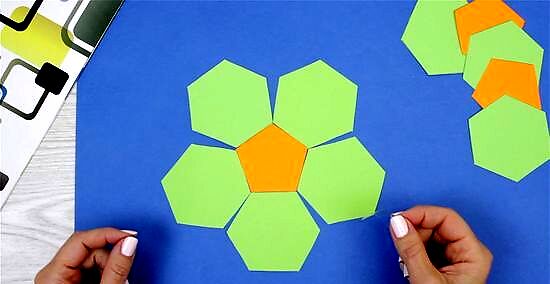
Fix a hexagon onto each side of one pentagon. Lay one pentagon flat on your working surface. Line up one side of one hexagon to one side of the pentagon, and tape the edges together. Repeat the process for the other four sides of the pentagon. You will use a total of one pentagon for this step and five hexagons. The edges of the hexagons and pentagon must be side by side without any gap in between them. The sides should not overlap. If you don’t have tape, you can glue on a connector piece. Use a 1-inch x 2-inch slip of paper as your connector. Add a thin strip of glue along each side of the paper, then attach it to the geometric steps.
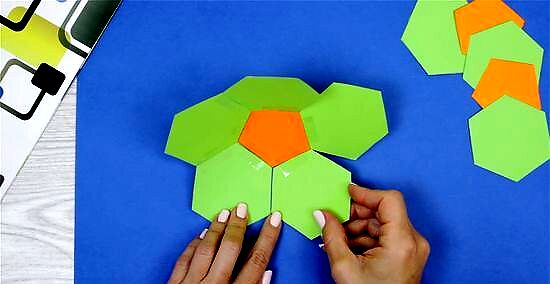
Connect the sides of the hexagons. Using your tape or connector strips, attach the hexagons to each other. Once this step is complete, you will have a shallow paper bowl.
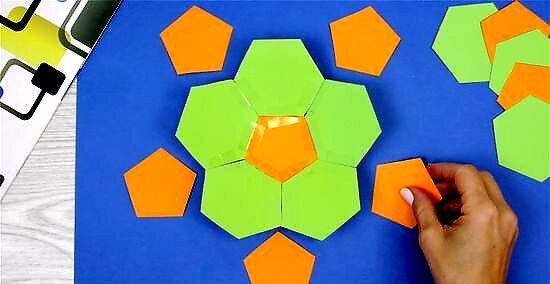
Add five more pentagons onto the bowl. Turn your pentagons so that one point is at the top. Fit this point into the crevice between two of the connected hexagons that form your bowl. Apply tape or a connector strip to the touching sides. There will be a flat hexagon side in between the pentagons. Each pentagon used in this step will lie adjacent to two different hexagons. Make sure that you tape both connecting edges in place.
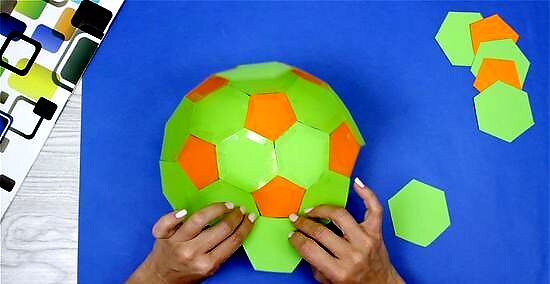
Wedge in five more hexagons. The space between the pentagons will look like half of a hexagon. Fit your hexagons into these spaces, attaching with tape or connector strips. Each hexagon used in this step will lie adjacent to three other edges in the structure. Tape all three edges down. Your sphere will be half complete.
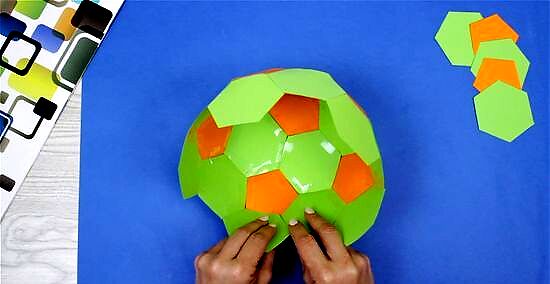
Build onto the structure with five more hexagons. You will notice that your bowl has nooks in the shape of a half-hexagon rather than a point, so you will add additional hexagons. Fit your hexagons into the crevices created between the last five hexagons. During this step, you should notice the sphere beginning to curve inward. You are completing the closed top portion now.
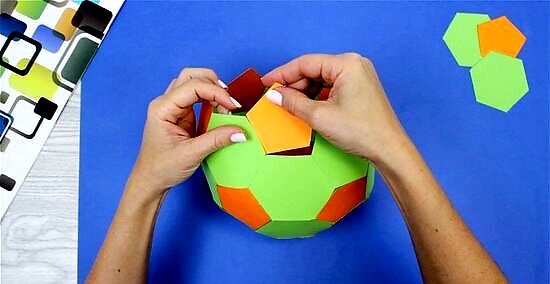
Connect five more pentagons. There should be five open nooks. Slide a pentagon into each one, taping or connecting the sides in place. This time, each pentagon will have three edges that lie adjacent to other edges in the structure. Tape all three down.
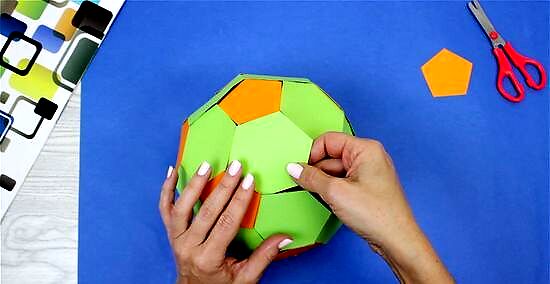
Add your five remaining hexagons. Slide one hexagon into each of the five nooks created by the last step. Apply your tape or a connector piece to secure the edges in place. The hexagons you just added will have edges that touch each other, so you will want to tape these down, too.
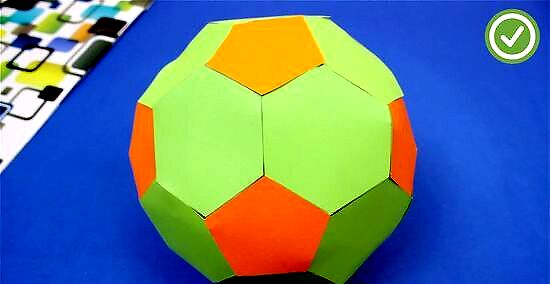
Attach the final pentagon. There should be a single pentagon shape left open in your sphere at this point. Rest your remaining pentagon on this spot and tape all five sides in place.













Comments
0 comment